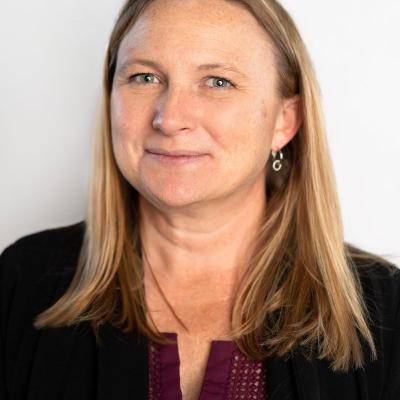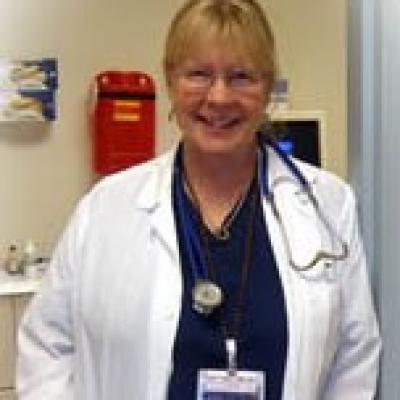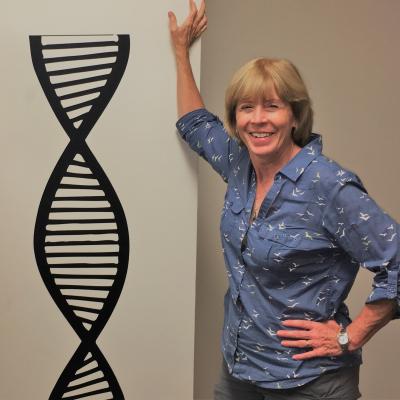Role Models and Mentorship
For many women, gender inequalities in STEM fields have lowered the access they have to role models and mentors early in their education and careers. This reduces the number of connections that women have that enable their scientific pursuits, though many women scientists have established wonderful mentorship relationships with men. Despite the importance of mentorship by male scientists, increasing numbers of women as role models and mentors is invaluable to the goal of improving gender equity in science (Science Magazine). In this section, these scientists talk about the impact of role models in their personal experiences.
Brittany Coats, PhD
Brittany Coats is a researcher and professor in the mechanical engineering department at the University of Utah. As the first female tenured full-professor in the mechanical engineering department here at the U, Brittany Coats knows exactly what it is like to be the first one to break through a glass ceiling. Her methods? Find a program and community that aligns with what you need as both a professional and a person. She acknolwdhes the great environment that has been cultivated here at the University of Utah's BME department. In addition to this she notes previous mentors that helped to guide her to find a program that she felt supported in.
"I think mechanical engineering has a great group, and the more that I see across the institution, the more I feel that. Like, it's really a good community. I was really fortunate to come here, and, actually, I think, I mentioned in the last interview, when I was applying at places I had multiple offers, and where did I go where I felt welcome and wanted and that continued. And so that was it, the faculty here are very collegial. They're very collaborative. You know, we're growing and we're getting bigger and bigger and some of that is hard to maintain as much because there's more people. And it's hard to know everyone as well as we used to, but still, I would say as I've compared myself to other institutions and even other departments, I really do think that we have a good collegial group. And I always felt supported by them at least in that regards. They did want me to be successful. I didn't feel like people were like trying to hold me back, and so I do think that. I do think that that was a little unique, too."
Holly Sebahar, PhD
Holly Sebahar cites many important mentors throughout her undergraduate and graduate careers, but there are two in particular that left a lasting impact on her. The first is Professor James Bonk, a renowned professor who taught at Duke University for 50 years. As a mentor, Dr. Bonk inspired Holly's teaching style and her devotion towards student success.
"And I would say, also, almost on a weekly basis, ask myself, “What would Jim do?” Because when you went to him with a problem like, “Oh, I'm having this problem in class,” or who knows what. If it was an especially hard problem, I remember, his eyes would kind of twinkle, he kind of, like, “Okay, this is hard.” He's like, “Okay, Holly, let me sleep on it, and then come back and see me the next day.” And without exception, he had come up with some kind of wonderful solution to that really hard problem. And I really appreciated that... I feel like Jim always wanted to do everything he could for all the students, he wanted to go that extra mile... So I try to take Jim with me as well."
The second and most influential mentor to Holly was her very first organic chemistry professor, who encouraged her to pursue a career in academia.
"The most important was my organic teacher, Nancy. She really took me under her wing. I think that was one advantage of going to a small school. There were 2000 of us at the University of Minnesota, Morris. And so we had 200 people in our organic class, but Nancy, you know, she was willing to sit with me and talk about all the potential jobs that might be ahead of me if I decided to go on with organic chemistry. She helped me get some research going with her while I was there just to get a flavor for that. She really supported me, in every way. And then I would say, also, at the University of Minnesota there were so many great teachers and so, when I look back, I have taken a little bit from each of them I think with me as a teacher now. I've taken things that they did that I just loved and brought it with me."
Kirtly Parker Jones, M.D.
Kirtly talks about how many of her professors and research mentors were male, as there were just not many women in higher up positions at that time. Many males mentors throughout her career opened doors for her, including the lab she was able to work in as well as getting her first job in a lab in medical school. She does however mention that although women were not in the lab or professor type positions often, there were supporting women in her life. She states that behind every successful woman is another woman. For her, this consisted of her nannies, administrative assistant, housekeeper, office cleaner, etc. Without their support, she states that her success would not have been possible.
"So the nature of mentoring someone was something that wasn't available. I wasn't looking for it either. I just didn't consider my gender as being an issue one way or the other until I got into medical school in college. And so there were men who lit the way for me, because there weren't really very women then. There were so many women though who helped light the way for me, helped me do my job. And I cannot thank them enough."
Cynthia Burrows, P.h.D.
In her experience, Cindy did not specify that she had any female role models. Given the time that she was getting her degrees, this was not such a big surprise seeing as there were very few women in science. Instead of role models, the interviewers found that there were experiences rather than people that awakened Cindy's interest in chemistry.
The biggest influence that she stressed was her honors chemistry course that she took at Boulder High school in Colorado. It's clear, from her description, that having a comfortable, friendly, and collegial atmosphere was a key aspect of this experience.
"And my senior year, there were two women in the class and 14 guys, and we were all best of friends. It was really pretty wonderful group of people. [During the class, our] teacher thought we should be conducting a research project. So we tested, you know, we did a scientific analysis, one teaspoon here, one and a half teaspoons in the next two, [we] added more and more sugar to these various bottles of beer and they still have yeast in them. Oh, well, too bad, but sure enough, you know, the first or second day back from the holiday break and we're sitting there I don't know balancing redox equations or some horrible thing, and all of a sudden kaboom, that sounds off about four of them. They all exploded in the back of the room. Oh, it was spectacular. Anyway, so yeah. You know, at that point I was pretty sold on chemistry...so then I was a chemistry major when I went to college, the next year."
Burrows' experience was greatly affected by this class and referenced it all throughout the interview.
Lisa Diamond, Ph.D
When studying at the University of Chicago from 1989 to 1992, Lisa found an interest in anthropology and psychology, but ultimately decided to major in psychology because, oddly enough, her best friend wanted to major in anthropology and she didn’t want to ruin their friendship.
"The psychology classes, that I was taking did not really light any sort of fire under me. They were very experimental and I didn't find them very interesting--they weren't nearly as intellectually challenging as the anthropology courses. But there were a number of faculty in anthropology who also view themselves sort of a psychologist or they would call themselves cultural psychologist and there was a little mini program at University of Chicago called the Committee on Human Development, which was basically like anthropological and psychologically oriented people."
One of those people on the Committee on Human Development was Gilbert Herdt, who was known for doing studies in Indonesia relating to sexual development. After taking one of his classes, Diamond decided she would continue reading and studying his work. Around that same time, Herdt began doing another project on gay and lesbian youth in Chicago with some other faculty on the Committee on Human Development, researching sexual development and finding out that teenagers and other young people were coming out as queer. This led to her discovery that there was a whole area of academia related to sexual development of queer youth, which ultimately lead her to her mentor, Ritch Savin-Williams at Cornell Univeristy, whom she describes as “a dear dear friend, to this day, and who, you know, I have so much gratitude for.” For Diamond, her experience of working with Savin-Williams was more than engaging and positive. He played a big role in the development and continuation of Diamond’s career, as well as the field of queer youth development as a field.
"Savin Williams... would just bring me in he's like oh somebody asked me to write a chapter on this stuff so you know let's write it together...Ritch was so generous, he was always pushing me forward...So I got a lot more, toward the end of my graduate career, I just got a lot more kind of opportunities."
Growing up, Amy noted never having women as models of science throughout her early education. However, after Amy's undergraduate work at Colorado State University, studying wildlife ecology, she went to work at the Colorado Natural Heritage Program, which was a crucial moment in her scientific career.
"That was the first time (Volunteering at Colorado Natural Heritage Program) I had direct and positive interactions with women in science. I was 22 before and didn’t have any access to a woman engaged in science. And so the lead botanist, the lead riparian ecologist, the co-director of the program were all women, amazing women. I continue to stay in touch with actually, who showed me that there's a way to be involved in science that’s not academia. That doesn't mean you have to give up or delay or deprioritize other aspects of your life like having kids… Also having access to the kinds of questions that I really was interested in pursuing if I were going to graduate school and then asking them also advice about graduate school. How do you go about it? My mom didn't even go to college, my dad went to medical school, didn't really apply to what I was doing. That was pivotal."
Page researched and written by Jacqueline Cockrell, Shaistah Din, Lydia Hall, Caitlin Pham, Jack Temme, and Isabel DuBay.
Later edited by Pamalatera C. Fenn



